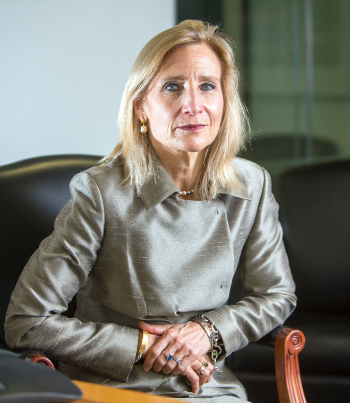
Lisa Osofsky ’83
Major: English
After 15 years on the lam, how does a serial scammer finally land behind bars? When a railroad company covers up its contract bribes, who convicts its leaders? When an electrical wholesaler bilks investors out of millions, who makes sure its lying executives pay them back?
“If there’s evidence of fraud or corruption, and it’s something that will harm the people or prosperity of the U.K.,” says Lisa Osofsky ’83, “the SFO is interested.”
Osofsky has directed the United Kingdom’s Serious Fraud Office since 2018. Each year, the SFO—a team of about 450 lawyers, accountants, digital forensics experts and others—investigates and prosecutes a select number of major economic crimes, such as the three recent cases described above.
The SFO addresses crimes that affect England, Wales and Northern Ireland, but many of its cases span the globe. “Criminals try to use borders to thwart us,” Osofsky says, so her office cooperates with other law enforcement bodies around the world.
She also believes in working closely with nongovernmental organizations and private businesses. “We all want the same thing,” she says. “NGOs and the private sector want a level playing field: markets that are not corrupted by players seeking an unlawful edge. Domestic and international law enforcement partners want to catch and prosecute criminals, vindicate the rights of victims and deter crime.”
In 21st-century fraud cases, the evidence is often not only international but also computerized—and voluminous. Starting in 2018 with an investigation into bribery and corruption at Rolls-Royce that involved some 30 million documents, the SFO has been using an artificial intelligence system to sort, analyze and find patterns within the data at superhuman speed. “Just as law enforcement adapted to telephones when they were new technology,” Osofsky says, “it will adapt to this new digital world.”
Criminals try to use borders to thwart us.
But the office still relies on what she calls “good old-fashioned investigative craft” that requires “a clear-eyed focus on the evidence.” In accepting the Cressey Award from the Association of Certified Fraud Examiners at its annual conference in Austin, Texas, in June, Osofsky warned against the all-too-human tendency to “fall in love with our own theories”: “The truth has to be our lodestar,” she said. “When we find inconvenient facts, it’s our obligation to change our hypothesis.”
Born in Brooklyn, N.Y., and raised in Illinois, Osofsky earned a J.D. from Harvard Law and became a federal prosecutor of white-collar crime in Chicago. The U.S. Department of Justice first sent her to the SFO from 1993 to 1995 to focus on the failure of the Bank of Credit and Commerce International (known in her field as the “Bank of Crooks and Criminals International”). Then came a five-year stint as deputy general counsel of the FBI, followed by other positions. One job involved enforcing the deferred prosecution agreement with HSBC, Europe’s largest bank, which was fined $1.9 billion for laundering Mexican drug money.
Osofsky has lived in London since 2000. She now holds dual citizenship in the U.S. and the U.K., and is qualified as a barrister in England and Wales. She credits her time at Amherst, and her junior year at Hebrew University in Jerusalem, with helping to inspire her lifelong commitment to public service and international cooperation.
The SFO director—who retains her American accent but employs British spelling—uses a linguistic metaphor for law enforcement efforts: “Every jurisdiction, like every culture, has its particular language, traditions and ways of doing things,” she says, “and the more multilingual we are, so to speak, the more effective our partnerships will be.”
Duke is Amherst magazine’s assistant editor.
Photograph by Carl Fox/Redux